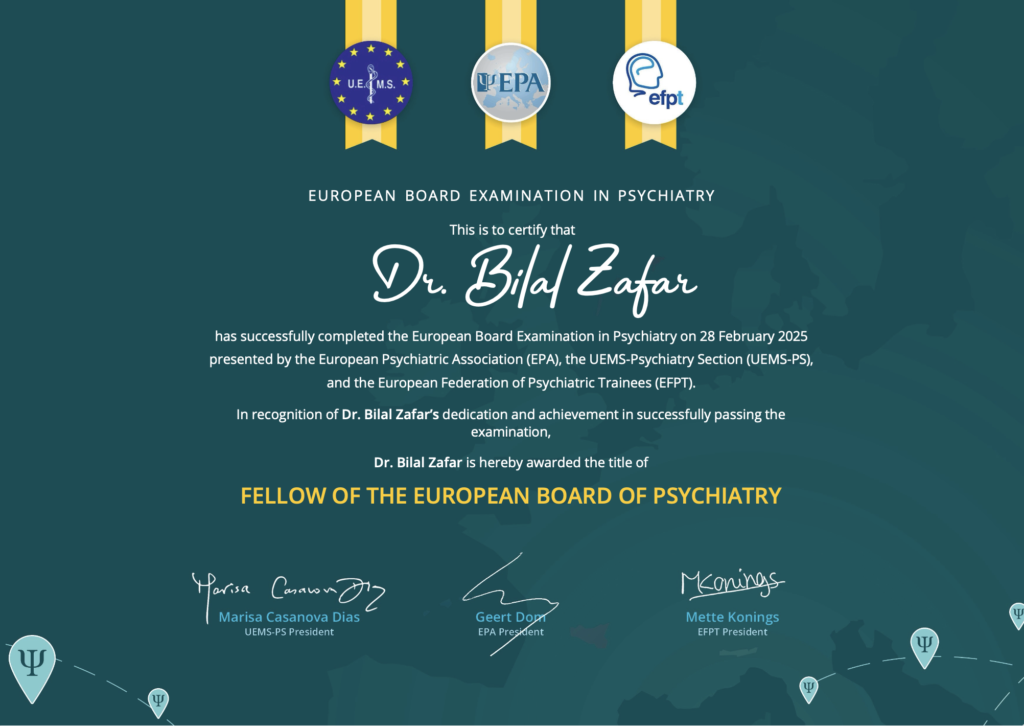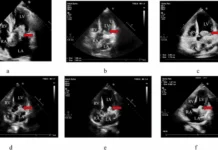
Pioneering Psychiatry: Dr. Bilal Zafar’s Journey Through the First EBP Fellowship Exam
At MEDizzy, we proudly celebrate doctors who push the boundaries of global medical excellence. In this feature, we tell the story of Dr. Bilal Zafar, who recently passed the first-ever Fellowship Examination of the European Board of Psychiatrists (EBP)—a landmark achievement in modern psychiatric education.
This newly introduced exam is a joint initiative by the European Union of Medical Specialists (UEMS), the European Federation of Psychiatric Trainees (EFPT), and the European Psychiatric Association (EPA). It is designed to assess the clinical knowledge, ethical reasoning, and cross-cultural sensitivity of psychiatrists committed to delivering high-quality mental health care in Europe and beyond.
My Experience with a Groundbreaking Exam Shaping the Future of European Psychiatry
I’m Dr. Bilal Zafar, a psychiatrist with over five years of clinical experience in the field. I completed my MBBS in 2018, followed by a postgraduate psychiatry residency at Liaquat National Hospital, Karachi, Pakistan. I also successfully cleared MRCPsych Paper A and B, which helped deepen my theoretical and diagnostic understanding. Beyond my clinical work, I’m actively engaged with Integral Eye Movement Therapy (IEMT) and currently serve as a member of the Advisory Board for the IEMT War Complex Trauma Project.
This year, I had the honour of sitting for the first-ever Fellowship exam of the European Board of Psychiatrists. This exam aligns perfectly with my personal values and clinical aspirations. It presented an opportunity to assess my psychiatric skill set against a pan-European benchmark that emphasizes ethical decision-making, cultural competence, and holistic patient care.
More than a Test—An Opportunity to Align Psychiatric Care with Global Standards of Empathy, Ethics, and Excellence
I was inspired by the global outlook of the EBP Fellowship. It’s not simply a test of knowledge but a reflection of how psychiatrists should reason, empathize, and act in complex clinical scenarios across diverse healthcare systems. The collaboration between UEMS, EFPT, and EPA gives this exam academic weight and cultural relevance. As someone passionate about high-standard psychiatric care, I saw it as a challenge worth taking—especially being part of its historic first cohort.
Structure of the Exam
The exam consists of 100 questions, in both written and multiple-choice questions (MCQs) format. These questions are designed to assess real-world clinical reasoning, not just recall of facts. The scenarios often require consideration of biopsychosocial models, ethical dilemmas, pharmacological choices, risk assessment, and cultural context. It is a three-hour online examination, and each question encourages reflection on safe, ethical, and evidence-based psychiatric practice.
Preparation Strategy
With no past candidates to learn from, I had to build my preparation strategy from scratch. I focused on key academic texts alongside applied clinical reasoning.
My primary study materials included
- Oxford Shorter Textbook of Psychiatry
- Hilgard’s Introduction to Psychology
- Oxford Handbook of Psychiatry
- Oxford Handbook of Medical Statistics
- Fish’s Clinical Psychopathology
- Stahl’s Essential Psychopharmacology
And the resources I used for MCQs included
- USMLE Psychiatry Question Banks
- LANGE Q&A Psychiatry, Latest Edition
In addition to self-study, I also had a study partner (Dr. Anju Shivram – a UK trainee) with whom I regularly discussed case scenarios, ethical dilemmas, and systems-based challenges in psychiatry. These focused discussions helped solidify not just theoretical knowledge but clinical judgment as well.
What Makes the EBP Exam Unique?
This exam doesn’t test how much you can memorize—it evaluates how you think as a psychiatrist. It’s less about isolated facts and more about how you synthesize information, navigate ambiguity, and place the patient at the center of your decision-making. Every question has an emotional, ethical, or social dimension, which reflects the real-life complexity of mental health care.
Facing the Unknown: Preparing for the First EBP Exam Without a Roadmap
The biggest challenge was the lack of established resources. Since it was the first sitting, there were no previous candidate experiences or official question banks. It pushed me to restructure my entire learning approach. The shift from traditional systems to a European psychiatric framework—which emphasizes human rights, diversity, and autonomy—was eye-opening and intellectually stimulating.
Advice for Future Candidates
Start with the official EBP syllabus and treat it like your anchor. Pair it with reputable textbooks and regularly engage in clinical reasoning exercises. Don’t underestimate the power of discussion—talk through dilemmas with colleagues from diverse backgrounds. That’s what truly prepares you for the multi-layered questions on this exam.
Final Reflections
The EBP Fellowship isn’t just a title—it’s a transformation of mindset. It challenges your clinical assumptions, deepens your ethical insight, and broadens your global perspective. For anyone who believes that psychiatry is as much about compassion and context as it is about science, I wholeheartedly recommend this journey.
If anybody has any questions about the exam or preparation, please feel free to reach out to me at zafarbilal575@gmail.com. I’d be happy to help.




